人教新目标八年级下册英语Unit 8 Have you read Treasure Island yet?Section A 2 2a – 2d 课件(共有PPT20张,含音频)
文档属性
| 名称 | 人教新目标八年级下册英语Unit 8 Have you read Treasure Island yet?Section A 2 2a – 2d 课件(共有PPT20张,含音频) |
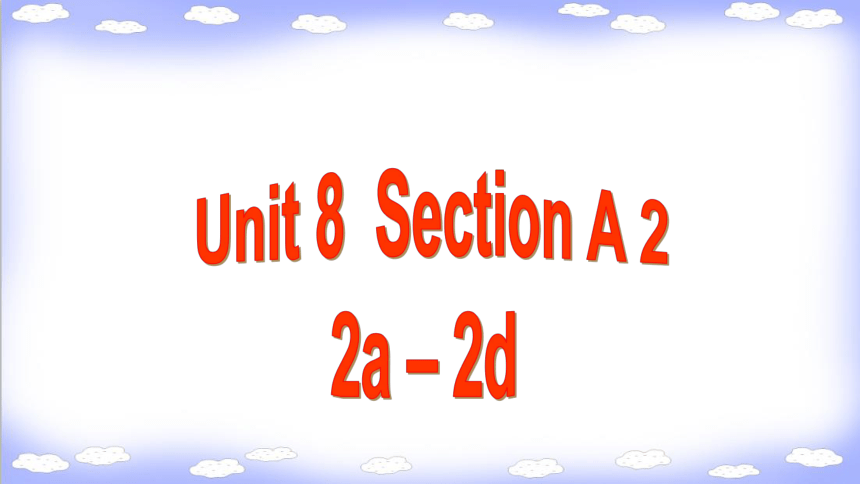
|
|
| 格式 | zip | ||
| 文件大小 | 1.6MB | ||
| 资源类型 | 教案 | ||
| 版本资源 | 人教新目标(Go for it)版 | ||
| 科目 | 英语 | ||
| 更新时间 | 2021-12-11 00:00:00 | ||
图片预览

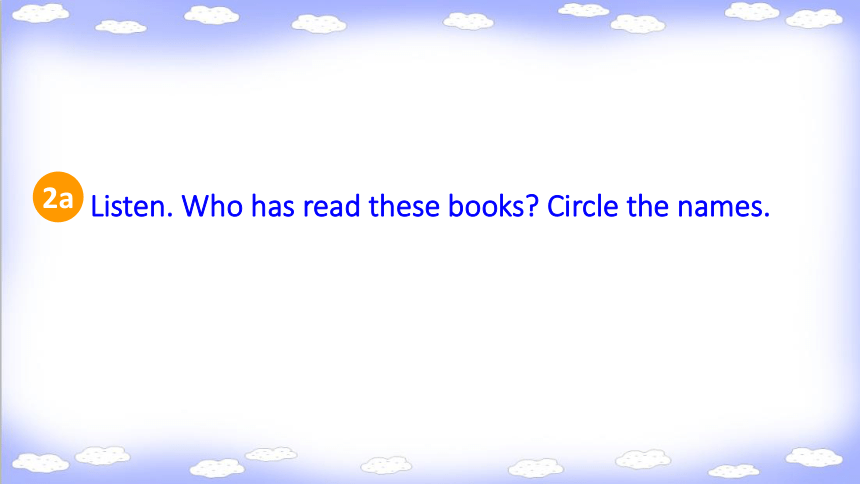
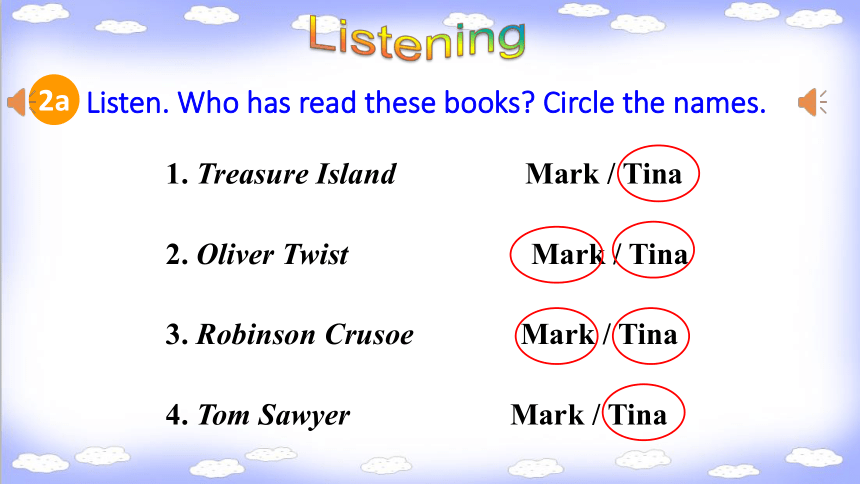
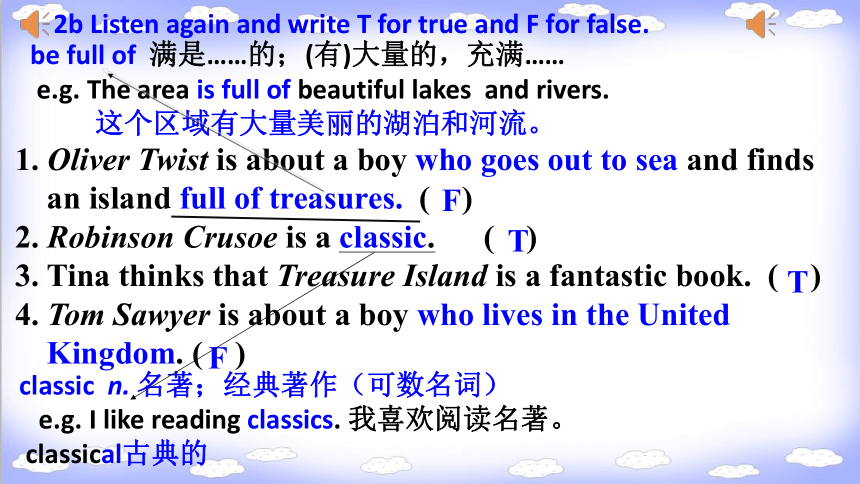
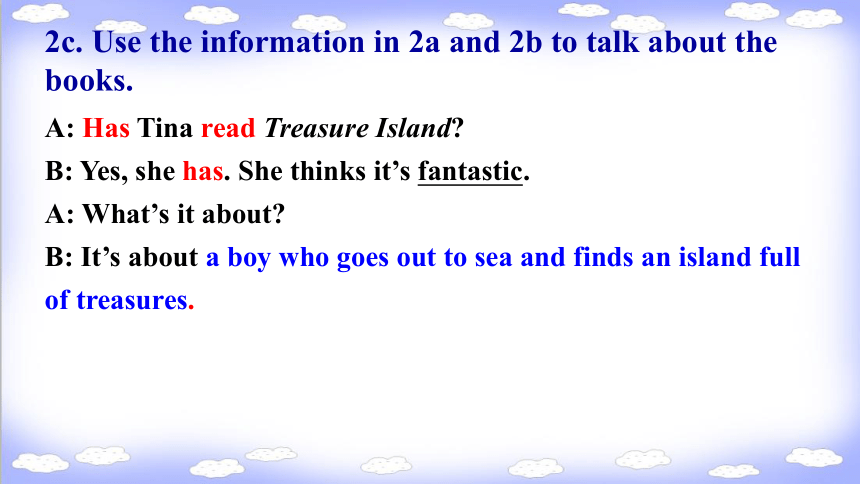
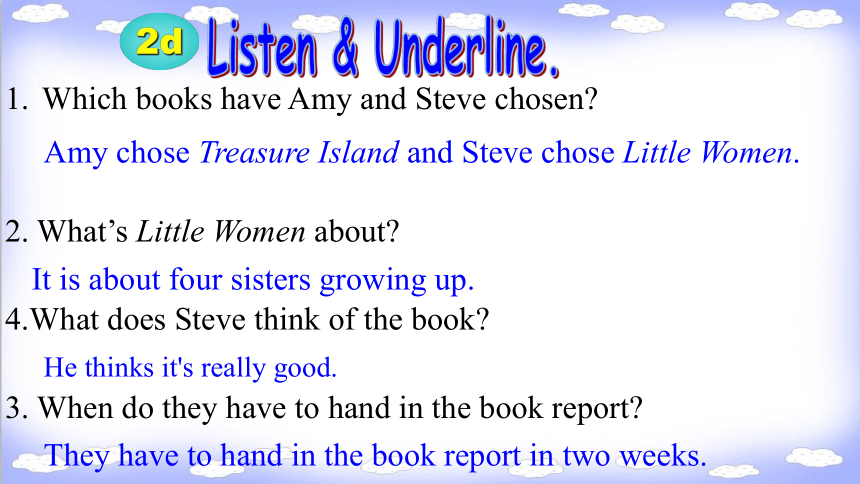
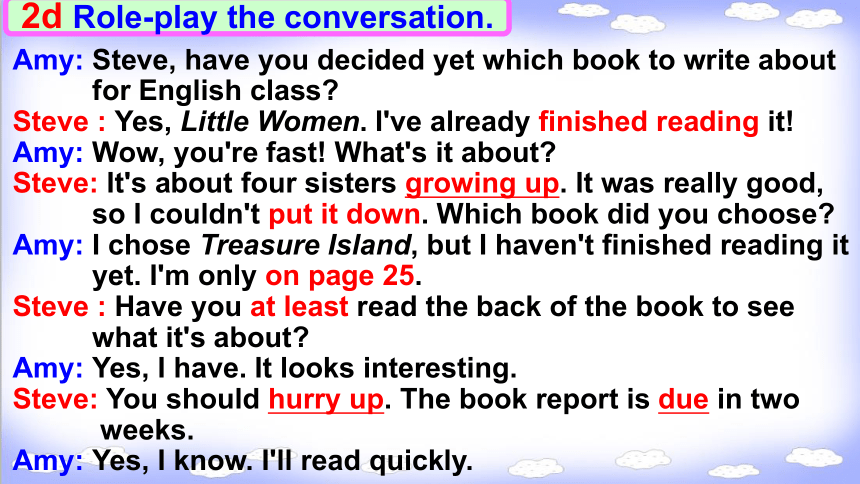
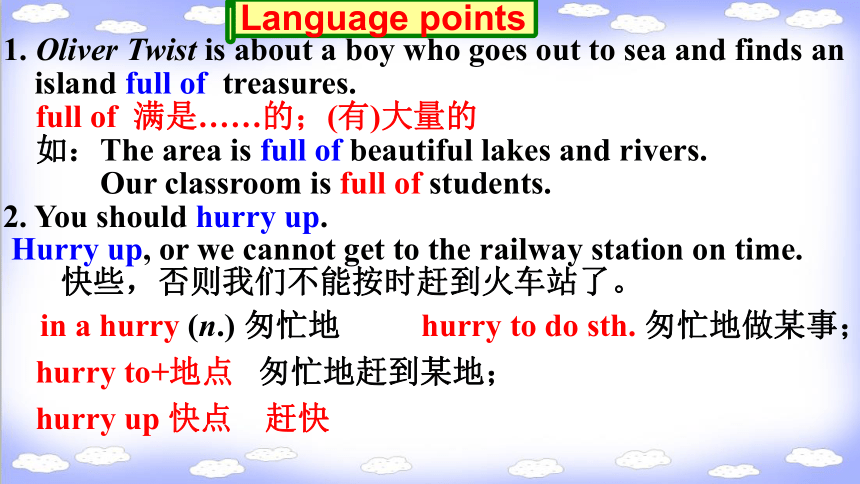
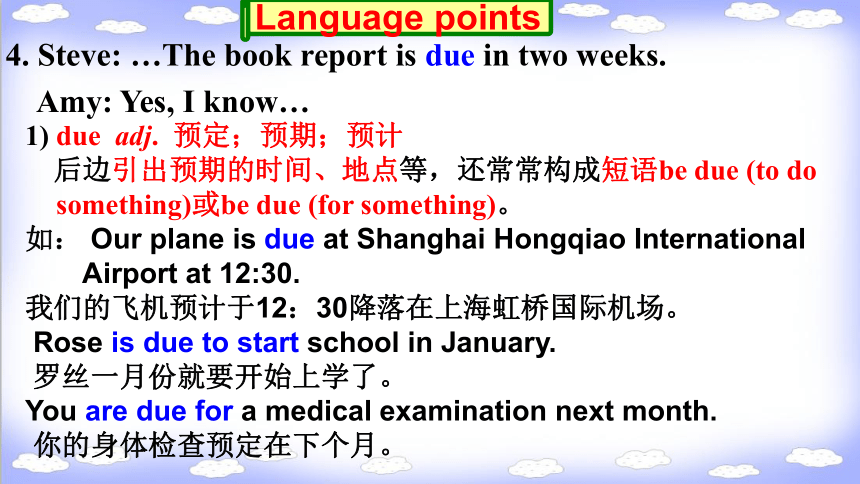
文档简介
(共20张PPT)
Unit 8 Section A 2
2a – 2d
Listen. Who has read these books Circle the names.
2a
1. Treasure Island Mark / Tina
2. Oliver Twist Mark / Tina
3. Robinson Crusoe Mark / Tina
4. Tom Sawyer Mark / Tina
Listen. Who has read these books Circle the names.
Listening
2a
1. Oliver Twist is about a boy who goes out to sea and finds an island full of treasures. ( )
2. Robinson Crusoe is a classic. ( )
3. Tina thinks that Treasure Island is a fantastic book. ( )
4. Tom Sawyer is about a boy who lives in the United Kingdom. ( )
2b Listen again and write T for true and F for false.
F
F
T
T
classic n. 名著;经典著作(可数名词)
e.g. I like reading classics. 我喜欢阅读名著。
classical古典的
be full of 满是……的;(有)大量的,充满……
e.g. The area is full of beautiful lakes and rivers.
这个区域有大量美丽的湖泊和河流。
A: Has Tina read Treasure Island
B: Yes, she has. She thinks it’s fantastic.
A: What’s it about
B: It’s about a boy who goes out to sea and finds an island full of treasures.
2c. Use the information in 2a and 2b to talk about the books.
2d
Listen & Underline.
Which books have Amy and Steve chosen
2. What’s Little Women about
4.What does Steve think of the book
3. When do they have to hand in the book report
Amy chose Treasure Island and Steve chose Little Women.
It is about four sisters growing up.
They have to hand in the book report in two weeks.
He thinks it's really good.
2d Role-play the conversation.
Amy: Steve, have you decided yet which book to write about
for English class
Steve : Yes, Little Women. I've already finished reading it!
Amy: Wow, you're fast! What's it about
Steve: It's about four sisters growing up. It was really good,
so I couldn't put it down. Which book did you choose
Amy: I chose Treasure Island, but I haven't finished reading it
yet. I'm only on page 25.
Steve : Have you at least read the back of the book to see
what it's about
Amy: Yes, I have. It looks interesting.
Steve: You should hurry up. The book report is due in two
weeks.
Amy: Yes, I know. I'll read quickly.
1. Oliver Twist is about a boy who goes out to sea and finds an island full of treasures.
full of 满是……的;(有)大量的
如:The area is full of beautiful lakes and rivers.
Our classroom is full of students.
2. You should hurry up.
Hurry up, or we cannot get to the railway station on time.
快些,否则我们不能按时赶到火车站了。
in a hurry (n.) 匆忙地 hurry to do sth. 匆忙地做某事;
hurry to+地点 匆忙地赶到某地;
hurry up 快点 赶快
Language points
4. Steve: …The book report is due in two weeks.
Amy: Yes, I know…
1) due adj. 预定;预期;预计
后边引出预期的时间、地点等,还常常构成短语be due (to do something)或be due (for something)。
如: Our plane is due at Shanghai Hongqiao International Airport at 12:30.
我们的飞机预计于12:30降落在上海虹桥国际机场。
Rose is due to start school in January.
罗丝一月份就要开始上学了。
You are due for a medical examination next month.
你的身体检查预定在下个月。
Language points
2) I know表示说话人对所谈的观点、内容已了解,无需多说,相当于汉语中“我早知道了;我全都了解”这样的意思,区别于许多日常交际场合中表示“我明白了;我知道了;我懂了”的用法。
如:A: It’s already very late. You should get some rest.
已经很晚了,你应该休息了。
B: Well, I know. Thanks. 对,我是知道的。谢谢。
Language points
注意,当我们获知对方提供的信息后,常用I see. 表示“我知道了;我明白了;我懂了”。
如:A: He lives in the countryside but works in the city during the week. 他住在乡下,但工作日在城里上班。
B: Oh, I see. 哦,我知道了。
一.基本结构:助动词have/has+过去分词(done)
二.句型:
肯定句:主语+have/has +过去分词+其他.
否定句:主语+have/has +not +过去分词+其他.
一般疑问句:Have/Has+主语+过去分词+其他?
简略答语: Yes, 主语 + have/has.(肯定)
No, 主语 + haven't/hasn't.(否定)
特殊疑问句:特殊疑问词+一般疑问句?不对主语提问)
现在完成时讲解
Explaining :
三.用法
Our teacher has just left .我们的老师现在不在这儿了。
We have studied English before .我们会一点儿英语。
I have already finished the homework .我不要做作业了。
He hasn't had his lunch yet.他现在饿了。
He has ever become a doctor .他有当医生的经验。
现在完成时态表示 :过去发生的动作对现在造成的影响或结果 。
1 、规则动词:规则动词的过去分词的构成规则与规则动词的过去式的构成规则相同。四点变化规则:
(1)、一般动词,在词尾直接加“ ed ”。
work---worked---worked ,visit---visited---visited
(2)、以“ e ”结尾的动词,只在词尾加“ d ”。
live---lived---lived ,
(3)、以“辅音字母 + y ”结尾的动词,将 "y" 变为 "i" ,再加“ ed ”。
study---studied---studied ,cry---cried---cried
(4)、重读闭音节结尾,末尾只有一个辅音字母,先双写该辅音字母,再加“ ed ”。
stop---stopped---stopped , drop---dropped--dropped
四. 过去分词构成
双写、变Y,e加d,其余ed不规则
动词过去式及过去分词不规则变化:
1. 以不变应万变。如:
let → let → let; put → put → put; read → read → read
2. 若中间有双写e,则去掉一个e,单词末尾再加t。如:
feel → felt → felt; keep → kept → kept; sleep → slept → slept
3. 结尾的字母d变t。如:
lend → lent → lent; build → built → built; send → sent → sent
4. 变为以-ought或-aught结尾。如:
buy → bought → bought; bring → brought → brought; catch → caught → caught; teach → taught → taught
AAA型
burst burst burst hurt hurt hurt
let let let cost cost cost
cut cut cut hit hit hit
put put put set set set
shut shut shut spread spread spread
read read read
AAB型 beat beat beaten
2 、不规则动词:
ABA型
become became become run ran run
come came come
ABB型
bring brought brought buy bought bought
build built built burn burnt burnt
catch caught caught dig dug dug
feel felt felt fight fought fought
find found found hear heard heard
hold held held keep kept kept
lay laid laid lead led led
lose lost lost make made made
meet met met sell sold sold
shoot shot shot sit sat sat
stand stood stood sweep swept swept
teach taught taught tell told told
think thought though win won won
ABC型
begin began begun blow blew blown
break broke broken choose chose chosen
draw drew drawn drive drove driven
drink drank drunk fly flew flown
forgive forgave forgiven forget forgot forgotten
freeze froze frozen give gave given
grow grew grown know knew known
ride rode ridden rise rose risen
ring rang rung shake shook shaken
sing sang sung sink sank sunk
swim swam swum throw threw thrown
write wrote written
Phrases:
hear of 听说
be like 像……一样
go out 出去
full of 充满
finish doing sth. 做完某事
be about 关于
grow up 长大
put +代词+ down 把……放下
hurry up 快点
Summary
1. I ________heard of that story before.
A. don’t have B. not have C. have not D. not to have
2. She’ s never been to that factory,_________
A. is she B. was she C. does she D. has she
3. Have you made dumplings__________ No, I haven’t.
A. just now B. yesterday C. ago D. before
4.I’ve______ this dictionary for half a year.
A. bought B. had C. lended D. borrowed
C
D
D
一 选择题
Exercise
B
( )1.Both his parents look sad . Maybe they____what's happened to him .
A. knew B. have known C. must know D.will know
( )2.He has _______ been to Shanghai , has he
A. already B.never C.ever D. still
( )3.Have you met Mr Li ______?
A. just B. ago C.before D. a moment ago
( )4.—______ you ___ your homework yet
—Yes . I _____ it a moment ago .
A. Did ; do ; finished B. Have ; done ; finished
C. Have ; done ; have finished D. will ; do ; finish
B
Checking :
B
C
B
Unit 8 Section A 2
2a – 2d
Listen. Who has read these books Circle the names.
2a
1. Treasure Island Mark / Tina
2. Oliver Twist Mark / Tina
3. Robinson Crusoe Mark / Tina
4. Tom Sawyer Mark / Tina
Listen. Who has read these books Circle the names.
Listening
2a
1. Oliver Twist is about a boy who goes out to sea and finds an island full of treasures. ( )
2. Robinson Crusoe is a classic. ( )
3. Tina thinks that Treasure Island is a fantastic book. ( )
4. Tom Sawyer is about a boy who lives in the United Kingdom. ( )
2b Listen again and write T for true and F for false.
F
F
T
T
classic n. 名著;经典著作(可数名词)
e.g. I like reading classics. 我喜欢阅读名著。
classical古典的
be full of 满是……的;(有)大量的,充满……
e.g. The area is full of beautiful lakes and rivers.
这个区域有大量美丽的湖泊和河流。
A: Has Tina read Treasure Island
B: Yes, she has. She thinks it’s fantastic.
A: What’s it about
B: It’s about a boy who goes out to sea and finds an island full of treasures.
2c. Use the information in 2a and 2b to talk about the books.
2d
Listen & Underline.
Which books have Amy and Steve chosen
2. What’s Little Women about
4.What does Steve think of the book
3. When do they have to hand in the book report
Amy chose Treasure Island and Steve chose Little Women.
It is about four sisters growing up.
They have to hand in the book report in two weeks.
He thinks it's really good.
2d Role-play the conversation.
Amy: Steve, have you decided yet which book to write about
for English class
Steve : Yes, Little Women. I've already finished reading it!
Amy: Wow, you're fast! What's it about
Steve: It's about four sisters growing up. It was really good,
so I couldn't put it down. Which book did you choose
Amy: I chose Treasure Island, but I haven't finished reading it
yet. I'm only on page 25.
Steve : Have you at least read the back of the book to see
what it's about
Amy: Yes, I have. It looks interesting.
Steve: You should hurry up. The book report is due in two
weeks.
Amy: Yes, I know. I'll read quickly.
1. Oliver Twist is about a boy who goes out to sea and finds an island full of treasures.
full of 满是……的;(有)大量的
如:The area is full of beautiful lakes and rivers.
Our classroom is full of students.
2. You should hurry up.
Hurry up, or we cannot get to the railway station on time.
快些,否则我们不能按时赶到火车站了。
in a hurry (n.) 匆忙地 hurry to do sth. 匆忙地做某事;
hurry to+地点 匆忙地赶到某地;
hurry up 快点 赶快
Language points
4. Steve: …The book report is due in two weeks.
Amy: Yes, I know…
1) due adj. 预定;预期;预计
后边引出预期的时间、地点等,还常常构成短语be due (to do something)或be due (for something)。
如: Our plane is due at Shanghai Hongqiao International Airport at 12:30.
我们的飞机预计于12:30降落在上海虹桥国际机场。
Rose is due to start school in January.
罗丝一月份就要开始上学了。
You are due for a medical examination next month.
你的身体检查预定在下个月。
Language points
2) I know表示说话人对所谈的观点、内容已了解,无需多说,相当于汉语中“我早知道了;我全都了解”这样的意思,区别于许多日常交际场合中表示“我明白了;我知道了;我懂了”的用法。
如:A: It’s already very late. You should get some rest.
已经很晚了,你应该休息了。
B: Well, I know. Thanks. 对,我是知道的。谢谢。
Language points
注意,当我们获知对方提供的信息后,常用I see. 表示“我知道了;我明白了;我懂了”。
如:A: He lives in the countryside but works in the city during the week. 他住在乡下,但工作日在城里上班。
B: Oh, I see. 哦,我知道了。
一.基本结构:助动词have/has+过去分词(done)
二.句型:
肯定句:主语+have/has +过去分词+其他.
否定句:主语+have/has +not +过去分词+其他.
一般疑问句:Have/Has+主语+过去分词+其他?
简略答语: Yes, 主语 + have/has.(肯定)
No, 主语 + haven't/hasn't.(否定)
特殊疑问句:特殊疑问词+一般疑问句?不对主语提问)
现在完成时讲解
Explaining :
三.用法
Our teacher has just left .我们的老师现在不在这儿了。
We have studied English before .我们会一点儿英语。
I have already finished the homework .我不要做作业了。
He hasn't had his lunch yet.他现在饿了。
He has ever become a doctor .他有当医生的经验。
现在完成时态表示 :过去发生的动作对现在造成的影响或结果 。
1 、规则动词:规则动词的过去分词的构成规则与规则动词的过去式的构成规则相同。四点变化规则:
(1)、一般动词,在词尾直接加“ ed ”。
work---worked---worked ,visit---visited---visited
(2)、以“ e ”结尾的动词,只在词尾加“ d ”。
live---lived---lived ,
(3)、以“辅音字母 + y ”结尾的动词,将 "y" 变为 "i" ,再加“ ed ”。
study---studied---studied ,cry---cried---cried
(4)、重读闭音节结尾,末尾只有一个辅音字母,先双写该辅音字母,再加“ ed ”。
stop---stopped---stopped , drop---dropped--dropped
四. 过去分词构成
双写、变Y,e加d,其余ed不规则
动词过去式及过去分词不规则变化:
1. 以不变应万变。如:
let → let → let; put → put → put; read → read → read
2. 若中间有双写e,则去掉一个e,单词末尾再加t。如:
feel → felt → felt; keep → kept → kept; sleep → slept → slept
3. 结尾的字母d变t。如:
lend → lent → lent; build → built → built; send → sent → sent
4. 变为以-ought或-aught结尾。如:
buy → bought → bought; bring → brought → brought; catch → caught → caught; teach → taught → taught
AAA型
burst burst burst hurt hurt hurt
let let let cost cost cost
cut cut cut hit hit hit
put put put set set set
shut shut shut spread spread spread
read read read
AAB型 beat beat beaten
2 、不规则动词:
ABA型
become became become run ran run
come came come
ABB型
bring brought brought buy bought bought
build built built burn burnt burnt
catch caught caught dig dug dug
feel felt felt fight fought fought
find found found hear heard heard
hold held held keep kept kept
lay laid laid lead led led
lose lost lost make made made
meet met met sell sold sold
shoot shot shot sit sat sat
stand stood stood sweep swept swept
teach taught taught tell told told
think thought though win won won
ABC型
begin began begun blow blew blown
break broke broken choose chose chosen
draw drew drawn drive drove driven
drink drank drunk fly flew flown
forgive forgave forgiven forget forgot forgotten
freeze froze frozen give gave given
grow grew grown know knew known
ride rode ridden rise rose risen
ring rang rung shake shook shaken
sing sang sung sink sank sunk
swim swam swum throw threw thrown
write wrote written
Phrases:
hear of 听说
be like 像……一样
go out 出去
full of 充满
finish doing sth. 做完某事
be about 关于
grow up 长大
put +代词+ down 把……放下
hurry up 快点
Summary
1. I ________heard of that story before.
A. don’t have B. not have C. have not D. not to have
2. She’ s never been to that factory,_________
A. is she B. was she C. does she D. has she
3. Have you made dumplings__________ No, I haven’t.
A. just now B. yesterday C. ago D. before
4.I’ve______ this dictionary for half a year.
A. bought B. had C. lended D. borrowed
C
D
D
一 选择题
Exercise
B
( )1.Both his parents look sad . Maybe they____what's happened to him .
A. knew B. have known C. must know D.will know
( )2.He has _______ been to Shanghai , has he
A. already B.never C.ever D. still
( )3.Have you met Mr Li ______?
A. just B. ago C.before D. a moment ago
( )4.—______ you ___ your homework yet
—Yes . I _____ it a moment ago .
A. Did ; do ; finished B. Have ; done ; finished
C. Have ; done ; have finished D. will ; do ; finish
B
Checking :
B
C
B
同课章节目录
- Unit 1 What's the matter?
- Section A
- Section B
- Unit 2 I'll help to clean up the city parks.
- Section A
- Section B
- Unit 3 Could you please clean your room?
- Section A
- Section B
- Unit 4 Why don't you talk to your parents?
- Section A
- Section B
- Unit 5 What were you doing when the rainstorm came
- Section A
- Section B
- Review of Units 1-5
- Unit 6 An old man tried to move the mountains.
- Section A
- Section B
- Unit 7 What's the highest mountain in the world?
- Section A
- Section B
- Unit 8 Have you read Treasure Island yet?
- Section A
- Section B
- Unit 9 Have you ever been to a museum?
- Section A
- Section B
- Unit 10 I've had this bike for three years.
- Section A
- Section B
